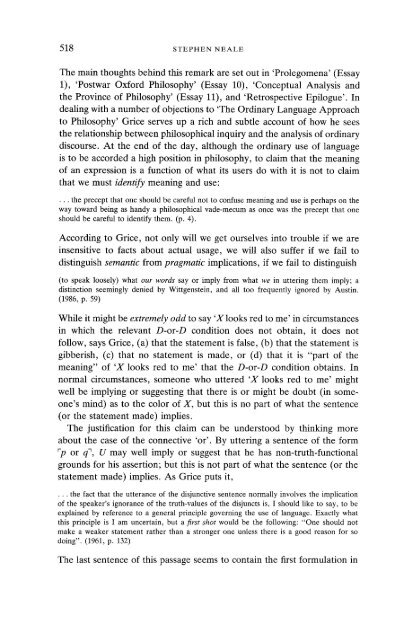Paul Grice and the philosophy of language
Paul Grice and the philosophy of language
Paul Grice and the philosophy of language
Create successful ePaper yourself
Turn your PDF publications into a flip-book with our unique Google optimized e-Paper software.
• . . <strong>the</strong><br />
518 STEPHEN NEALE<br />
The main thoughts behind this remark are set out in 'Prolegomena' (Essay<br />
1), 'Postwar Oxford Philosophy' (Essay 10), 'Conceptual Analysis <strong>and</strong><br />
<strong>the</strong> Province <strong>of</strong> Philosophy' (Essay 11), <strong>and</strong> 'Retrospective Epilogue'. In<br />
dealing with a number <strong>of</strong> objections to 'The Ordinary Language Approach<br />
to Philosophy' <strong>Grice</strong> serves up a rich <strong>and</strong> subtle account <strong>of</strong> how he sees<br />
<strong>the</strong> relationship between philosophical inquiry <strong>and</strong> <strong>the</strong> analysis <strong>of</strong> ordinary<br />
discourse. At <strong>the</strong> end <strong>of</strong> <strong>the</strong> day, although <strong>the</strong> ordinary use <strong>of</strong> <strong>language</strong><br />
is to be accorded a high position in <strong>philosophy</strong>, to claim that <strong>the</strong> meaning<br />
<strong>of</strong> an expression is a function <strong>of</strong> what its users do with it is not to claim<br />
that we must identify meaning <strong>and</strong> use:<br />
•.. <strong>the</strong> precept that one should be careful not to confuse meaning <strong>and</strong> use is perhaps on <strong>the</strong><br />
way toward being as h<strong>and</strong>y a philosophical vade-mecum as once was <strong>the</strong> precept that one<br />
should be careful to identify <strong>the</strong>m. (p. 4).<br />
According to <strong>Grice</strong>, not only will we get ourselves into trouble if we are<br />
insensitive to facts about actual usage, we will also suffer if we fail to<br />
distinguish semantic from pragmatic implications, if we fail to distinguish<br />
(to speak loosely) what our words say or imply from what we in uttering <strong>the</strong>m imply; a<br />
distinction seemingly denied by Wittgenstein, <strong>and</strong> all too frequently ignored by Austin.<br />
(1986, p. 59)<br />
While it might be extremely odd to say 'X looks red to me' in circumstances<br />
in which <strong>the</strong> relevant D-or-D condition does not obtain, it does not<br />
follow, says <strong>Grice</strong>, (a) that <strong>the</strong> statement is false, (b) that <strong>the</strong> statement is<br />
gibberish, (c) that no statement is made, or (d) that it is "part <strong>of</strong> <strong>the</strong><br />
meaning" <strong>of</strong> 'X looks red to me' that <strong>the</strong> D-or-D condition obtains. In<br />
normal circumstances, someone who uttered 'X looks red to me' might<br />
well be implying or suggesting that <strong>the</strong>re is or might be doubt (in someone's<br />
mind) as to <strong>the</strong> color <strong>of</strong> X, but this is no part <strong>of</strong> what <strong>the</strong> sentence<br />
(or <strong>the</strong> statement made) implies.<br />
The justification for this claim can be understood by thinking more<br />
about <strong>the</strong> case <strong>of</strong> <strong>the</strong> connective 'or'. By uttering a sentence <strong>of</strong> <strong>the</strong> form<br />
rp or q~, U may well imply or suggest that he has non-truth-functional<br />
grounds for his assertion; but this is not part <strong>of</strong> what <strong>the</strong> sentence (or <strong>the</strong><br />
statement made) implies. As <strong>Grice</strong> puts it,<br />
fact that <strong>the</strong> utterance <strong>of</strong> <strong>the</strong> disjunctive sentence normally involves <strong>the</strong> implication<br />
<strong>of</strong> <strong>the</strong> speaker's ignorance <strong>of</strong> <strong>the</strong> truth-values <strong>of</strong> <strong>the</strong> disjuncts is, I should like to say, to be<br />
explained by reference to a general principle governing <strong>the</strong> use <strong>of</strong> <strong>language</strong>. Exactly what<br />
this principle is I am uncertain, but a first shot would be <strong>the</strong> following: "One should not<br />
make a weaker statement ra<strong>the</strong>r than a stronger one unless <strong>the</strong>re is a good reason for so<br />
doing". (1961, p. 132)<br />
The last sentence <strong>of</strong> this passage seems to contain <strong>the</strong> first formulation in














